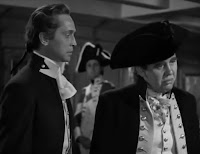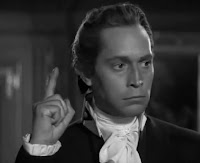Mutiny on the Bounty
I'm worn out. You'd be worn out, too, if you'd just finished Mutiny on the Bounty. What a picture. Such work. The location was at Catalina. We climbed up the rigging and sat on guns, and bits of mast kept falling on us.
Franchot is invariably bored. He had no scenes on board ship that day, but I saw him in the evening on land nonchalantly putting nickels in the marble machine. He looked surprised at my appearance and inquired, "What for heaven's sakes are you doing here?" And when I told him he said, "My, it doesn't seem possible anyone would deliberately choose such an assignment! When Clark asked to go on a speed boat that night Franchot "wouldn't be bothered".
However, I think Muriel caught Franchot on an off day—possibly she may have visited when he had a painful tooth that had to be extracted—because Franchot and other cast members bonded over shooting and fishing. In fact, Franchot and Clark—often considered rivals because of their mutual love for Joan Crawford—became fast friends on the set and held admiration for one another because of the experience. For example, New Movie Magazine wrote in September 1935:
And so to a hectic day with the Mutiny on the Bounty company at Catalina aboard an exact replica of the old Bounty that was sunk by mutineers 150 years ago in the South Seas near Tahiti. Discovering that it was really great sport to shoot fish, Clark Gable could be found hanging over the ship's rail any time of day drawing a bead on any herring or filet of sole that happened to be unfortunate enough to swim that way. Watching the fun Franchot Tone, Herbert Mundin and Donald Crisp were so intrigued that they sent ashore for some rifles and in no time at all the placid Bounty sounded like nothing so much as a man-o-war going full blast!
an epic of man's struggle for justice and peace, embracing every emotion of mankind, with the restless, tireless, ageless sea for its setting.
The National Board of Review agreed:
In its best and predominate sequences it fills the screen with cinematically visualized imagination. It opens up the sea, and the sea moves or lies placid. It brings the wind and it lets it go. It brings the ship, her sweat, blood, and vigor, her sadness and the sorrow of her people, in a word, her spirit, her adventure, and her end—it brings these succinctly, visually, movingly, as only the motion picture can, and must do.
 |
And Franchot was praised as a star to watch. Topper's Film Reviews in Hollywood Magazine noted:
Franchot Tone emerges as the big hit of the picture. He drew the only burst of applause at the preview upon completion of his defense in the Admiralty Court on mutiny charges.
Hollywood magazine predicted that Franchot would emerge an in-demand star in 1935:
The role of Roger Byam was one of the biggest plums of the year in Hollywood, and it fell to Franchot Tone by the sort of accident that put him in Lives of a Bengal Lancer. Another actor withdrew to take a different picture assignment and history repeated itself when the Bounty was cast. Robert Montgomery was broken-hearted when other work interfered and Tone got the job. The role fits him glove tight, and depend on it, Franchot will emerge a star when the Bounty is shown. He, too, did his share of suffering for the sake of Metro, to make the Bounty. A paining tooth was no fun, marooned as he was a the isthmus, but a boat finally was hired and he had the tooth yanked without delaying production. Metro chose wisely in casting Franchot, for bear in mind that Gable leaves the picture after the mutiny, and so does Captain Bligh. Laughton and Tone must carry the picture from then on.
Franchot Tone's studio kept him in white tie and tails most of the time and never gave the poor guy a chance to act. But Paramount borrowed him for The Lives of a Bengal Lancer and he gave such a good performance that his home studio gave him the third most important part in Mutiny on the Bounty and dead indeed is your soul if you did not thrill to his speech before the big shots of the British Navy. But, unfortunately, Franchot's reward for this magnificent bit of acting was one of the dullest parts of the year in a very dull picture called Exclusive Story.
Mutiny was the highest grossing film of 1935 and won the Academy Award for Best Picture. Franchot, Clark and Charles were all nominated as Best Actor for their performances, yet all lost to Victor McLaglen for The Informer—in future years the Best Supporting Actor award would be introduced. The film also received nominations for Best Director, Best Screenplay, Best Music Score and Best Film Editing.
I would be remiss to write a post on Mutiny without including these three photos which I spotted in past online auctions, but sadly (nearly inconsolable about the first one) I did not win.
 |
| Un-retouched candid photo of Franchot on the set |
 |
| A candid of Franchot with a fan on the set. |
 |
| Another candid of Franchot with fans on the set. |
The Film
Set in England in 1787, Mutiny on the Bounty begins with laboring men of all ages being forced into two years of naval service on the HMS Bounty. In stark contrast to the men unhappy to have their freedom taken away, wealthy Roger Byam (Franchot Tone) is eager to board the ship. Byam is very green and idealistic—so much so that Christian (Clark Gable) remarks "A little child shall lead them" when Byam asserts that the ship is safe under his command. Unlike the other men, he has no clue as to how traumatic the next two years of his life will be. After all, Byam is going along for scientific study. Because of his societal position and his family's prominent naval history, Byam has been assigned the task of writing a dictionary of the Tahitian language. When he is warned that Captain Bligh is a "seagoing disaster," the good-natured Byam laughs.Discipline's the thing. A seaman's a seaman. A captain's a captain. And a midshipman—Sir Joseph or no Sir Joseph—is the lowest form of animal life.
We're off around the world, boys. Light hearts and tight britches off around the world...Don't worry, Stewart, if you get tangled, I'll jump in and pull you out...Mr. Christian holds no terrors for me. I can wade the seven seas and never wet my shirt. They have whales down there that can sink a ship but I can sink the whale. Behold the face that launched a thousand ships!
You may have it but I'll escape if I can.
That didn't hurt. What hurts is that you and I can never again be friends.
Milord, as much as I desire to live, I am not afraid to die. Since I first sailed on the Bounty over 4 years ago, I've known how men can be made to suffer worse things than death—cruelly, beyond duty, beyond necessity.
Captain Bligh, you've told your story of the mutiny on the Bounty, how men plotted against you, seized your ship, cast you adrift in an open boat. A great venture in science brought to nothing. Two British ships lost. But there's another story, Captain Bligh...of ten coconuts and two cheeses and a story of a man who robbed his seamen, cursed them, flogged them not to punish but to break their spirit. A story of greed and tyranny and of anger against it, of what it cost.
One man, milord, would not endure such tyranny. That's why you hounded him, that's why you hated him, hated his friends. And that's why you're beaten. Fletcher Christian's still free. But Christian lost too, milord. God knows he's judged himself more harshly than you could judge him. I say to his father, he was my friend, no finer man ever lived. I don't try to justify his crime, his mutiny, but I condemn the tyranny that drove him to it.
I don't speak here for myself alone but for these men you've condemned. I speak in their names and Fletcher Christian's name and all men at sea. These men don't ask for comfort. They don't ask for safety. If they could speak to you they'd say "Let us choose to do our duty willingly, not the choice of a slave but the choice of free Englishmen." They ask only the freedom that England expects for every man. If one man among you believe that, one man, he could command the fleets of England. He could sweep the seas for England if he called his men to their duty not by flaying their backs, but by lifting their hearts, their...that's all.























No comments:
Post a Comment